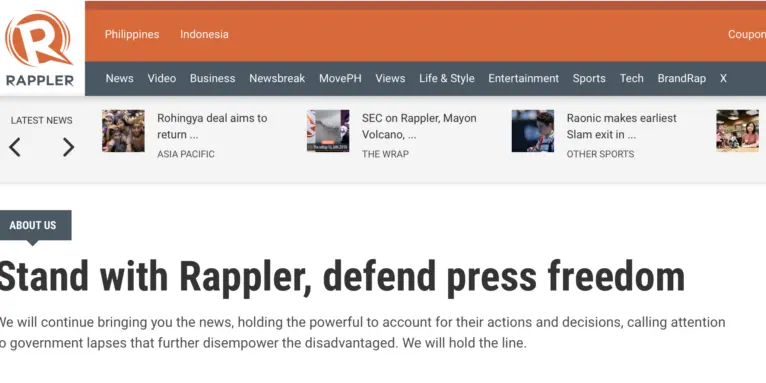
ASEAN MPs concerned over move to close Philippine media outlet
December 20, 2017

JAKARTA – Regional parliamentarians expressed grave concern today over efforts by the Philippine government to shut down Rappler, a prominent online media outlet, which has reported critically on the administration and policies of President Rodrigo Duterte.
On 15 January, the Philippine Securities and Exchange Commission (SEC) revoked Rappler’s certificate of incorporation, accusing the media outlet of violating constitutional and statutory restrictions on ownership of mass media entities. Rappler had been repeatedly targeted by the administration and its allies in the months leading up to this decision. In July 2017, President Duterte threatened to investigate Rappler’s ownership in his State of the Nation Address, and the outlet faced significant harassment from pro-administration bloggers.
“There appears to be little doubt that this decision is politically motivated, and the move against Rappler fits clearly into a larger pattern of harassment against voices critical of President Duterte and his policies,” said Malaysian MP Charles Santiago, who serves as Chairperson of ASEAN Parliamentarians for Human Rights (APHR).
“It is particularly alarming to see these developments taking place in the Philippines, which has long been a model for press freedom in ASEAN. Rappler had been doggedly reporting on issues like the war on drugs, which this administration doesn’t want criticized, managing to continue its important work under increasingly difficult circumstances. But after jailing political critics and threatening human rights activists, it appears that the President has now set his sights on muzzling the media.”
APHR noted that the case underscores a wider a regional trend of escalating harassment of media professionals and efforts to limit press freedom. MPs further highlighted the arrest and ongoing detention of two Reuters journalists in Myanmar and the closure of The Cambodia Daily newspaper and over a dozen radio stations in Cambodia in August and September 2017.
“Freedom of the press is crucial for the development of strong and stable societies based on democratic principles. Yet increasingly throughout our region, journalists have been threatened and arrested and media outlets have been closed without due process,” said APHR Vice Chair Eva Kusuma Sundari, a member of the Indonesian House of Representatives.
“If we really want to progress, we need to start not only valuing the work of journalists but also extending to them all the protections they are afforded under international law. Only when we take these steps will we have a chance to call ourselves truly democratic.”
With the ruling due to be appealed by Rappler, parliamentarians called on the Philippine judiciary to carefully review the case, giving paramount consideration to freedom of expression and freedom of the press and ensuring that due process and the rule of law are upheld.
“The Philippines’ proud tradition of openness and its strong media sector, committed to promoting accountability, are at risk. The government must halt its attacks against the press and protect freedom of expression, not only for Rappler but for all in the Philippines. As we await a final decision in this case, we stand with Rappler and their dedicated staff as they fight for their rights to continue to report on what is happening in the Philippines,” Santiago said.
ASEAN Parliamentarians for Human Rights (APHR) was founded in June 2013 with the objective of promoting democracy and human rights across Southeast Asia. Our founding members include many of the region's most progressive Members of Parliament (MPs), with a proven track record of human rights advocacy work.